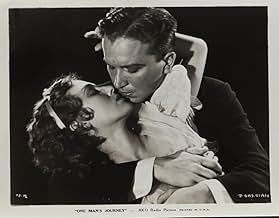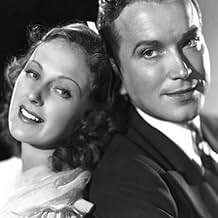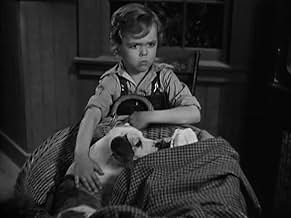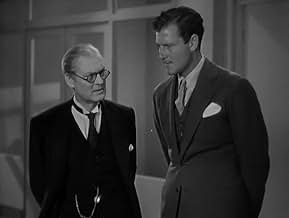Widower Dr. Watt moves to a small town, raising son Jimmy and abandoned Letty. Despite aspirations for research, epidemic, family needs hinder his goals. Years later, he realizes his life wa... Read allWidower Dr. Watt moves to a small town, raising son Jimmy and abandoned Letty. Despite aspirations for research, epidemic, family needs hinder his goals. Years later, he realizes his life wasn't a failure.Widower Dr. Watt moves to a small town, raising son Jimmy and abandoned Letty. Despite aspirations for research, epidemic, family needs hinder his goals. Years later, he realizes his life wasn't a failure.
- Awards
- 3 wins total
Samuel S. Hinds
- Dr. Babcock
- (as Sam Hinds)
Frank Ball
- Townsman
- (uncredited)
Dorothy Gray
- Letty's Daughter
- (uncredited)
John Ince
- Dr. James Carson
- (uncredited)
Lloyd Ingraham
- Townsman at Farewell Meeting
- (uncredited)
Dave O'Brien
- Dance Extra
- (uncredited)
Featured reviews
Lionel Barrymore gave a memorably restrained performance in this 1933 film. It stands as a precursor to films such as 1959's "The Last Angry Man" with Paul Muni.
The setting takes place in rural America circa 1910. Having lost his wife in childbirth, Barrymore returns to his roots only to lose his first patient there as well to child-birth. The embittered husband is ready to take the baby to the poor house but Barrymore takes the little baby girl in along with his young son. Just on the girl's 4th birthday, the father returns and seems much reformed. Barrymore gives the girl, Letty, back to him. Letty maintains a father-like relationship with Barrymore through the years.
As the years pass, Barrymore wins the hearts of the town with his dedication and free services for the impoverished.
He lets opportunities pass which could have gotten him out of the town. Some how we know this from the George Bailey effect of 1946's "It's A Wonderful Life." Like George Bailey, this doctor is going nowhere.
May Robson costars as a beloved housekeeper who enters the Barrymore home at precisely the right time.
This is a nicely done heartwarming story of rural America from 1910 through 1933.
The setting takes place in rural America circa 1910. Having lost his wife in childbirth, Barrymore returns to his roots only to lose his first patient there as well to child-birth. The embittered husband is ready to take the baby to the poor house but Barrymore takes the little baby girl in along with his young son. Just on the girl's 4th birthday, the father returns and seems much reformed. Barrymore gives the girl, Letty, back to him. Letty maintains a father-like relationship with Barrymore through the years.
As the years pass, Barrymore wins the hearts of the town with his dedication and free services for the impoverished.
He lets opportunities pass which could have gotten him out of the town. Some how we know this from the George Bailey effect of 1946's "It's A Wonderful Life." Like George Bailey, this doctor is going nowhere.
May Robson costars as a beloved housekeeper who enters the Barrymore home at precisely the right time.
This is a nicely done heartwarming story of rural America from 1910 through 1933.
One Man's Journey (1933)
** 1/2 (out of 4)
Standard drama from RKO about a country doctor (Lionel Barrymore) who could have had anything in life but he gave it all up to help others. This is the same role that Barrymore played in D.W. Griffith's The Country Doctor and he pretty much nails it. I guess there could be debate on whether John or Lionel were better actors but I think I'd give my vote to Lionel for being able to be more calm and deliver performances that aren't just over the top. He's very caring and stern here and the strong supporting cast including May Robson, Dorothy Jordan, Joel McCrea and Frances Dee do fine work as well. The one problem is that it's all very familiar and there aren't any surprises along the way.
** 1/2 (out of 4)
Standard drama from RKO about a country doctor (Lionel Barrymore) who could have had anything in life but he gave it all up to help others. This is the same role that Barrymore played in D.W. Griffith's The Country Doctor and he pretty much nails it. I guess there could be debate on whether John or Lionel were better actors but I think I'd give my vote to Lionel for being able to be more calm and deliver performances that aren't just over the top. He's very caring and stern here and the strong supporting cast including May Robson, Dorothy Jordan, Joel McCrea and Frances Dee do fine work as well. The one problem is that it's all very familiar and there aren't any surprises along the way.
Lionel Barrymore played a country Doctor who healed bodies as well as hearts. He helps Dorothy Jordan and James Bush and than later, Joe McCrea ( as his son) and Frances Dee. He played a character who was good hearted & hard working & was often only paid with potatoes as recompense. Sentimental, up-lifting, self-sacrifice & nobility all figure into the picture. It was remade in 1938 as A Man to Remember with Edward Ellis in the Barrymore role. The roles of Dee & Bush were dropped & in this case the son ( lee Bowman) falls in love with Anne Shirley--as the Jordan character. Acting was good all around. Jordan is pretty much forgotten today. She made several films in the early '30's and then married Merian C.Cooper. McCrea & Dee married shortly after making this picture. James Bush was in many films up to the early '50's, mostly in small, uncredited roles.
This is one of the "lost but found" films shown on TCM on 4/4/07. Apparently this and two other films shown that night were held out of public release due to litigation concerning royalties and now the powers that be at Turner Classic Movies have taken care of the licensing issues. Of the three films shown that night, none of them were great treasures but all three were excellent--very solid examples of the type of films RKO made during the era. Normally, when you think of RKO in 1933, you think KING KONG or Astaire and Rogers as a team, but there were other good films that might rank just below them in quality and entertainment.
This film is rather reminiscent of several other doctor dramas from the era (such as THE CITADEL and ARROWSMITH) where the doctor's nobility and sacrifice are celebrated. A younger Lionel Barrymore (sporting a dark doo thanks to hair dye) comes to a rural area to set up a medical practice. However, at first, he is unsuccessful and only begins to get patients when he agrees to use the barter system. Because of this, he is constantly in financial straits, but because he is so noble and decent, he doesn't give up and is eventually accepted and loved by the community. While all this could have been VERY syrupy, thanks to good writing and a terrific performance by Barrymore it is not.
There is certainly a lot more to the movie than this--including an excellent (as usual) performance by May Robson and an early performance by Joel McCrea. See this film and see a "small" film that really packs an excellent punch.
This film is rather reminiscent of several other doctor dramas from the era (such as THE CITADEL and ARROWSMITH) where the doctor's nobility and sacrifice are celebrated. A younger Lionel Barrymore (sporting a dark doo thanks to hair dye) comes to a rural area to set up a medical practice. However, at first, he is unsuccessful and only begins to get patients when he agrees to use the barter system. Because of this, he is constantly in financial straits, but because he is so noble and decent, he doesn't give up and is eventually accepted and loved by the community. While all this could have been VERY syrupy, thanks to good writing and a terrific performance by Barrymore it is not.
There is certainly a lot more to the movie than this--including an excellent (as usual) performance by May Robson and an early performance by Joel McCrea. See this film and see a "small" film that really packs an excellent punch.
Lovely movie from an earlier time. Incredibly well-acted by most concerned. Except for McCrea, who, it seems to me, is as stiff as a board. While I realize he was supposed to exude a sort of heartless diffidence, I don't think that's the problem; I just don't think he had really come into his own yet. Of course he was a tall, handsome guy with a good voice and, with time, he became a solid actor -- but it's interesting to see him upstaged by almost everyone in this early entry.
And while the film can feel "dated," what is one to expect from a bit of art that was made so long ago? Perhaps that sense of "datedness" comes from the fact that today we are just so "aware" and cynical. Personally, I like the tone of the film....
And while the film can feel "dated," what is one to expect from a bit of art that was made so long ago? Perhaps that sense of "datedness" comes from the fact that today we are just so "aware" and cynical. Personally, I like the tone of the film....
Did you know
- TriviaMerian C. Cooper had accused RKO of not paying him all the money contractually due for six RKO films he produced in the 1930s. In 1946, a settlement was reached, giving Cooper complete ownership of the RKO titles: Idylle sous les toits (1933) with Ginger Rogers, La femme aux gardénias (1933) with Ann Harding and William Powell, The Right to Romance (1933) with Ann Harding and Robert Young, One Man's Journey (1933) with Lionel Barrymore, Living on Love (1937) and A Man to Remember (1938).
In 2006, Turner Classic Movies, which had acquired the rights to the six films after extensive legal negotiations, broadcast them on TCM in April 2007, their first full public exhibition in over 70 years. TCM, in association with the Library of Congress and the Brigham Young University Motion Picture Archive, had searched many film archives throughout the world to find copies of the films in order to create new 35mm prints.
- GoofsAs Dr. Watt leaves the McGinnis house, the shadows of the trees fall clearly on the "sky" cyclorama.
- ConnectionsFeatured in TCM: Twenty Classic Moments (2014)
- SoundtracksDown By the Old Mill Stream
(1910) (uncredited)
Written by Tell Taylor
In the score during the opening credits and at the end
Details
- Runtime1 hour 12 minutes
- Color
- Aspect ratio
- 1.37 : 1
Contribute to this page
Suggest an edit or add missing content






































